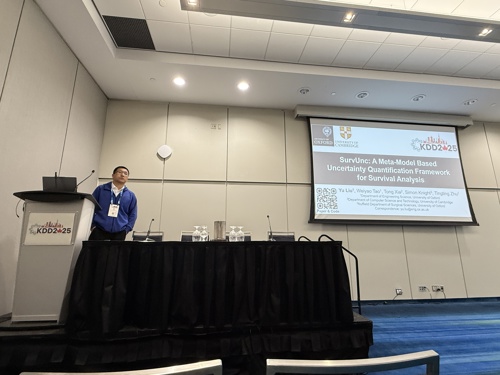04 Aug 2025
AI4DH Members Present Research at KDD 2025

On 4 August 2025, members of the AI4DH Lab attended the KDD 2025 conference to present their latest research contributions. Yu delivered an oral presentation of his paper SurvUnc: A Meta-Model Based Uncertainty Quantification Framework for Survival Analysis. His work introduces a novel framework to reliably quantify uncertainty in survival models, an essential step for making predictions more interpretable and trustworthy in healthcare and other high-stakes applications. SurvUnc is model-agnostic and demonstrated strong performance across multiple benchmarks, paving the way for more reliable survival predictions. For more information, please refer to the paper.

Yu also presented at the MILETS workshop, where he introduced M2Traj: A Data-Driven Framework for Multimorbidity Trajectory Identification from Multi-Disease Diagnosis Time Series. This work analyses longitudinal health records to reveal how chronic conditions evolve together across the lifespan, identifying stable patterns and key transition points. The findings provide valuable insights for long-term prevention, risk stratification, and disease management. In addition, at the EAI workshop, Yu presented his study Uncovering Social Disparities in Primary Care through Data-Driven Multimorbidity Profiling. This research highlights how multimorbidity intersects with social determinants of health, uncovering pronounced disparities linked to deprivation, ethnicity, and geography, and emphasising the need for more equitable healthcare strategies. For more information, please refer to the MILETS and EAI.
Munib also gave an oral presentation at the TGL workshop on his work Multi-Modal Interpretable Graph for Competing Risk Prediction with Electronic Health Records. His research presents a graph learning framework that integrates diverse patient data, including time-series, demographics, and diagnostic histories, into a unified patient graph. The model improves the prediction of multiple competing outcomes while offering interpretability across modalities, outperforming existing approaches on several real-world datasets. For more information, please refer to the paper.
In addition, Mingcheng presented a poster at the MILETS workshop on his work MedTPE: Compressing Long EHR Sequence for LLM-based Clinical Prediction with Token-Pair Encoding. His method reduces the length of EHR token sequences, improving the efficiency of large language models in clinical prediction tasks while enabling more context input. For more information, please refer to the paper.
The conference also recognised the outstanding contributions of AI4DH members in the reviewing process, with Tingting and Yu both receiving Outstanding Reviewers awards.








